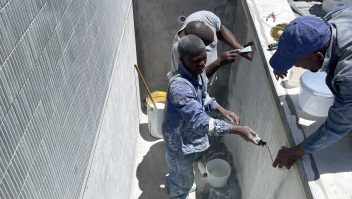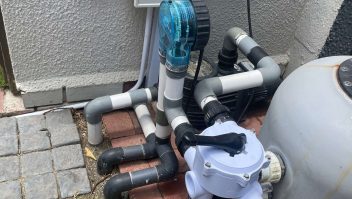Maintaining the right alkalinity levels in your pool is key to ensuring balanced water chemistry. Pool alkalinity acts as a buffer to stabilize the pH levels of your pool water, preventing drastic swings in acidity or alkalinity that can damage the pool and irritate swimmers’ skin and eyes. The Pool Alkalinity Calculator helps you determine how much alkalinity you need to add or adjust to keep your pool water properly balanced.
What Is Pool Alkalinity?
Total Alkalinity (TA) refers to the concentration of alkaline substances in your pool water, primarily bicarbonates, carbonates, and hydroxides. It helps to buffer the pH level and prevent it from fluctuating too much, which can cause staining, scaling, and corrosion in your pool equipment and surfaces.
Ideal Alkalinity Levels
- Recommended Total Alkalinity (TA): 80–120 ppm (parts per million)
- Levels that are too high or low can result in pH imbalance and impact the effectiveness of other chemicals, such as chlorine.
How to Use the Pool Alkalinity Calculator
To accurately calculate how much alkalinity you need to add to your pool, you’ll need:
- Pool volume in litres
- Current alkalinity level (measured in ppm)
- Desired alkalinity level (typically between 80–120 ppm)
Once you have this information, the calculator will tell you the amount of sodium bicarbonate (baking soda) or another alkalinity increaser needed to raise the alkalinity to the desired level.
Sample Dosage Guide (for a 50,000L pool):
- To raise the alkalinity by 10 ppm: Add approximately 500g of sodium bicarbonate (baking soda).
How to Adjust Pool Alkalinity
- Test your pool water: Use a pool test kit or test strips to measure the current alkalinity level.
- Calculate the amount of alkalinity increaser: Use the Pool Alkalinity Calculator to determine how much to add.
- Add the alkalinity increaser: Slowly add the recommended amount of sodium bicarbonate to the pool, preferably in areas of high water circulation (near return jets).
- Retest the water: After a few hours, retest the alkalinity to ensure it’s in the ideal range.
Maintenance Tip
Always add chemicals gradually and avoid large additions, as sudden changes can cause water chemistry to fluctuate. Regularly check alkalinity levels and make minor adjustments as needed to ensure stable pH levels.
Internal Links
- Pool pH Calculator: How To Get Your pH Level In Range
- Pool Chlorine Calculator: How Much Chlorine Do You Need to Add?
- How to Maintain Your Pool
External Links
FAQ Section
1. What happens if my pool’s alkalinity is too low?
Low alkalinity can cause pH levels to fluctuate, making it harder to maintain stable water chemistry. It may also lead to pool surface damage and irritation to swimmers.
2. How often should I test my pool’s alkalinity?
Test your pool’s alkalinity at least once a week, especially during the swimming season, or after heavy rain or chemical treatments.
3. Can I use baking soda to increase my pool’s alkalinity?
Yes! Sodium bicarbonate (baking soda) is a common and effective method to raise alkalinity levels in your pool.
4. What should I do if my alkalinity is too high?
If your alkalinity is too high, you may need to add an acid like muriatic acid to bring it down to the ideal level. Always consult a professional if you’re unsure.
5. Why is maintaining proper alkalinity important?
Proper alkalinity helps stabilize pH levels, ensuring that the water remains comfortable for swimmers and preventing damage to pool equipment and surfaces.
A balanced total alkalinity is essential for maintaining clear, safe, and comfortable pool water. Use the Pool Alkalinity Calculator to determine the right amount of alkalinity increaser for your pool, and ensure that your water chemistry stays in perfect balance. For expert pool maintenance and water chemistry guidance, contact Pools Reno today!
10. Pool Salt Calculator: How Much Salt Do You Need to Add?.



